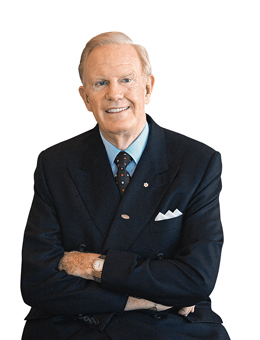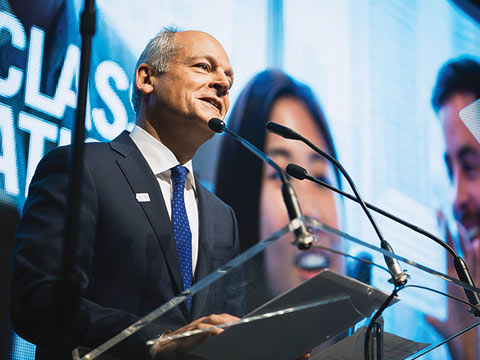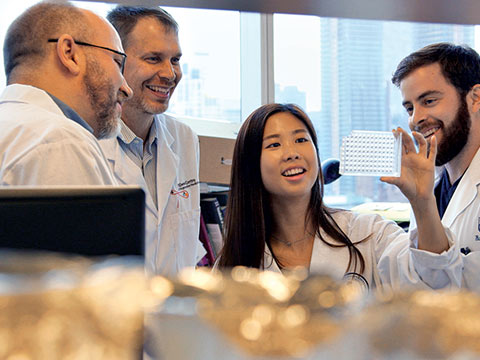With the goal to reduce hospitalization for heart failure by 50 per cent over the next decade, the University of Toronto, the Hospital for Sick Children and the University Health Network (UHN) have announced the creation of the Ted Rogers Centre for Heart Research, funded by an unprecedented donation of $130 million from the Rogers family – the largest monetary gift ever made to a Canadian health-care initiative.
“We’re thrilled to be able to bring the Ted Rogers Centre for Heart Research to life,” says Loretta Rogers, wife of the late Ted Rogers. “We know Ted would have been proud of this bold initiative that will improve heart health for all.”
“The generosity and magnitude of this gift, and the transformational effect it will have on heart research, truly reflects the pioneering and innovative spirit of Ted Rogers and his family,” says Dr. Michael Apkon, president and CEO of Sick Kids. “This powerful, collaborative partnership among Sick Kids, UHN and U of T will have a global impact. Together we hope to accelerate discovery and cardiac care at an unprecedented pace.”
Heart disease represents a considerable economic strain on the Canadian health-care system. The annual cost for managing moderate and severe heart failure patients in Canada is as much as $2.3 billion. “Today, one million Canadians are living with heart failure, and that number is projected to increase 25 per cent over the next 20 years,” notes Dr. Barry Rubin, chair and program medical director of the Peter Munk Cardiac Centre and a professor of surgery at U of T. “This unprecedented gift will enable research teams in the Ted Rogers Centre for Heart Research to develop new therapies that will dramatically improve the lives of patients with heart disease.”

The Ted Rogers Centre for Heart Research will bring together more than 30 expert clinicians and researchers from across the partner institutions, as well as up to 80 graduate students, post-doctoral fellows and clinical fellows who represent the future of the field. This critical mass of expertise will improve treatments for heart patients – and develop entirely new therapies.
The centre will be a magnet to attract additional research talent from around the world, solidifying Toronto’s and Canada’s position as a global leader in cardiac care, notes Meric Gertler, president of U of T.
“The Toronto region is home to one of the world’s largest biomedical science and health education clusters,” says Gertler. “This exceptionally powerful network of researchers and educators is translating exciting ideas, innovations and therapies in stem cell research and regenerative medicine into clinical settings where they will address the most challenging problems across the spectrum of heart disease. With its pioneering spirit and innovative approach, the Ted Rogers Centre for Heart Research will be a world-class collaboration and a most fitting tribute to its namesake.”
The centre will have facilities in each of the three participating institutions (see below). It will be the first in the world to bring together research, education and innovation in personalized genomic medicine, stem cell research, bioengineering, and cardiovascular treatment and management under one umbrella with a single focus: improving heart health across the entire lifespan, from children to adults.

Professor Peter Zandstra, a lead U of T investigator for the Ted Rogers Centre for Heart Research, says patients with valve disorders, for example, typically need several complex operations during their lifetime to implant larger valves to accommodate the growing heart. They also require drugs to keep their heart from rejecting valve replacements. “Research at the centre could one day lead to the regeneration of a valve with the patient’s own cells – eliminating a lifetime of chronic illness,” he says.
Cardiac fibrosis is a stiffening of the heart tissue that leads to a variety of cardiac diseases, including heart failure. Zandstra says advances in tissue engineering at U of T will accelerate the discovery of biomaterials that could be used to treat fibrosis, bringing new hope to patients.
Research at the university will also enlarge our understanding of how genetic, molecular signalling and cellular networks function as the heart develops, opening up the possibility for more effective heart therapies.
U of T scientists will also create technologies and tools for improved heart physiology monitoring, in clinical settings and for patients at home. These efforts will lead to more seamless, integrated care for heart patients.
The Ted Rogers Centre for Heart Research will also establish a competitive innovation fund to drive discovery and development of next-generation therapies for heart failure, and an education fund to attract the best and brightest students and postgraduates to ensure a deep pool of talent in Canada for cardiac care and research.
Over the next decade, the Ted Rogers Centre for Heart Research will help enable more people – adults and children alike, in Canada and around the world – to live long, healthy and happy lives.
Watch heart patients and doctors explain why the collaboration built into the Ted Rogers Centre for Heart Research is key to breakthrough discoveries and huge impact:





